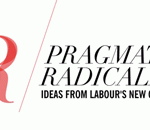
Originally published in the New Statesman, 11 July 2011.
A bigger state isn’t necessarily a better state, argues Mike Harris.
Under Gordon Brown the Labour party went through an intellectual desert in which radicalism of any shade was viewed as highly suspect.
While the Tories took big ideas to the core of their mission – especially Phillip Blond’s Big Society (demolished in the London Review of Books here) – Labour went into the last election with an ideology so narrow and statist we may as well have used Hobbes’s Leviathan as our manifesto. The public viewed us as the ‘big state’ party.
As Josie Cluer, John Denham’s former special adviser, says:
During 2010, Labour sometimes sounded like we thought all that mattered in public services was increased investment. To any question raised about quality or poor service, every Labour minister and activist had been taught to trot out the real terms increase in spending on key public services since 1997. We resorted to cheap political point-scoring by deploying “Tory cuts vs Labour spending” dividing lines. In fact, they were more damaging to us than our opponents.
In opposition, Labour is undergoing an intellectual renaissance. Sadly, much of it seems to be replaying the Blair/Brown/left dialogues of the past. Even if it isn’t, the blinkered media (many of whom made their careers upon spreading each camp’s smears) want it to be.
Pragmatic Radicalism, a series of snappy articles by Labour’s next generation, attacks the aridity of the past, and attempts to break out from the Blair/Brown rut we found ourselves in.
Luciana Berger MP launches the project tomorrow in committee room 12 of the House of Commons alongside Lord (Stewart) Wood, Ed Miliband’s strategic adviser, and the editor John Slinger, who if there is any justice ought to be in the next intake of Labour MPs.
The articles are diverse. Will Straw and Nick Anstead want reform of the party itself. In a brave move they embrace the offer in the coalition agreement to fund open primaries. Amanda Ramsay wants a one per cent football transfer tax to fund school playing fields. Larry Smith wants to ‘unsqueeze the middle’ with targeted VAT cuts.
One common theme is that the last Labour government felt that more state was better state. Josie Cluer writes: It’s a common doorstep conversation: why should I pay my taxes and work hardm when others milk the system?” She adds:
It’s the little things. Even though there are five million people on waiting lists for social housing, some people still rent out their council homes… those responsible for the 12.6 million missed GP appointments and the 4.3 million missed nurse appointments are not just wasting millions of pounds, they’re preventing people who really need healthcare from getting it…
The more often principles of fairness are undermined, the weaker public support for public services becomes.
It’s not just that Labour’s bigger state often failed the fairness test; it was given too many powers. I call for the rebirth of liberal Labour – whose heyday under John Smith saw Labour call for the European Convention on Human Rights ‘brought home’ into British law.
In a lecture to Charter 88 in 1993 he said: “I want to see a fundamental shift in balance of power between the citizen and the state – a shift away from an overpowering state to a citizens’ democracy where people have rights and powers.”
Smith’s ‘rights and powers’ is so much more uplifting than Blair’s ‘rights and responsibilities’. Key to a reborn liberal Labour is recognising the importance of the liberal tradition in our party’s history – a history that former Stalinist John Reid and David Blunkett did their best to bury. It’s a history we need to reconnect with in order to begin winning elections again:
Labour is now perceived as the big state party. Our reckless disregard for the personal sphere lost us 5 million votes between 1997 and 2010: we were the bossy party.
To recognise this history, Labour should call for a Bill of Rights that creates a home-grown privacy law, protects free speech and demarks the boundaries of state intrusion.
Admittedly, in otherwise thought-provoking articles in the collection, the Pavlovian impulse to make cheap points about the Tories sometimes obscures sounder criticisms.
In Tom Tabori’s article on housing he outlines some depressing statistics: 1.5 million adults in the UK live in homes with overcrowded conditions; a quarter of overcrowded families have children sleeping in living or dining rooms; the Government classes 250,000 social homes as overcrowded. Yet according to the Government, five million people are still stuck on waiting lists.
Labour failed on social housing, but Tabori is too polite to say so. I would argue that without the ability to criticism the last Labour government, whose record on housing was patchy at best, we’re unable to discover our blind spots.
It’s been a good seven days for Ed Miliband. He took on the largest media owner in the country – and won. If he is prepared to listen to his vocal membership, Labour has a manifesto in waiting: both pragmatic and radical. The disastrous 2010 election must not be repeated. Never again should ‘big’ ideas be taken so lightly.
Mike Harris is a Labour councillor in Lewisham Central and Head of Advocacy at free speech organisation Index on Censorship. He tweets: @Cllr_MikeHarris




